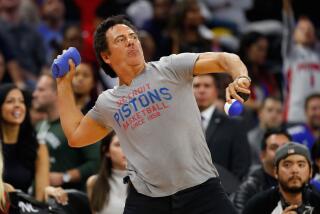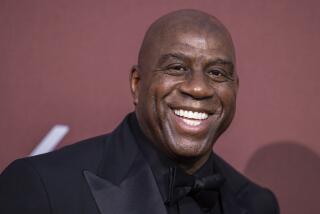Wilt Could Well Be Stuff of Greatness as Owner in NBA
- Share via
Wilt Chamberlain was on the phone. Actually, I phoned him, but he spoke first.
“I need a favor,” Wilt said.
What can I do for you, Wilt? Use my influence to get you a title fight with Mike Tyson? Teach you my lethal topspin beach volleyball serve? Give you Kareem’s phone number so you can invite him to your next seminar on the art of rebounding?
“I could use some favorable ink on my attempt to buy an NBA franchise,” Wilt said. “I’d be the first black owner of a sports team in history.”
Actually, he would be the second, in North America anyway. The first black team owner, as I learned later in our conversation, was Wilt Chamberlain, 21 years ago.
That’s been somewhat of a secret until right now. More about that in a minute.
Chamberlain and two partners are trying to land an expansion franchise for the city of Toronto. Failing that, they will try to buy an existing NBA team and move it to Toronto. Failing that, they will try to buy Toronto and move it to an existing NBA team.
Wilt’s two partners want him to run the show. It would be Wilt’s team.
Perfect! Since he retired in ‘73, Wilt has spurned many offers to come back as a player. The excuse he always gives is that no owner would ever hire Wilt on his terms, allow him the freedom to skip some of the games and all of the afternoon shootarounds. Now, however, he would be dealing with an owner who understands and admires Wilt’s idiosyncrasies.
“I really came into this as a total business venture, not as a ploy to come back and play,” Wilt said. “I would be looking forward to adding input to the team on a physical level, as well as a mental level, but only by working with our centers in practice.”
Wait a minute, Wilt. Here’s the scenario: You’re the owner of a pathetic expansion team. Your center is a dog. Attendance is down. You’ve whipped yourself into marvelous shape in those practice sessions. The temptation is enormous to sign yourself to a 15-day contract.
“I won’t rule out anything in life,” Wilt said, “but that’s not my idea this particular moment.”
Wilt is serious. He really wants to own a team, for three reasons: to be a pioneer; to help the good old NBA, and to demonstrate his talent in one more arena of life.
“We do live in a time and age where role models and heroes are the point of order,” Wilt said. “Most of them seem to be athletes or musicians. Very few business people. This would help add another dimension to people’s thinking.
“I think it would be a statement. Buying a sports team would seem a little more hallowed than buying a baked bean factory. Sports is the biggest area in terms of prestige, and I would have a chance to show minority people that you can do something in sports other than be a glorified home-run hitter or dunker of basketballs.”
Besides that, Wilt sees himself as a throwback to the owners of yore, the seat-of-the-pants guys who loved the game dearly, knew it intimately and helped keep it alive in the early years.
“Owners of teams now are usually people who have done very well in business,” Wilt said, “but most of them don’t know much about the sport. Jerry Buss, I love him dearly, but I don’t know what kind of basketball man or hockey man he is.
“Seldom do you get a chance to get the old, grass-roots basketball people. Those owners are dead and gone.”
And about to be collectively reincarnated in one seven-foot package.
“We all like to think we’re designers or artists,” Wilt said. “You look at the three successful franchises--Boston, L.A. and Philadelphia--and there are reasons for their success. I think the Lakers have maybe bought their success a little more than the other teams, but there are solid reasons those three teams win.
“I owe a lot to basketball and I would really appreciate the opportunity to be an architect of something like that one day, a team to rival the Lakers or Celtics or Sixers. And I would like to think I would do it as a business venture, not by just spending millions but by having a talent for it.”
Wilt has some ideas to help the league, too, of course. Shorten the regular season, perhaps. Widen the floor to help neutralize the giants. Let the Celtics play the Lakers more than twice during the regular season.
And add to his resume this item: Previous experience as an owner.
Wilt once owned 25% of the Philadelphia 76ers. He was aced out of his share, which would be worth about $10 million today.
It happened in 1965, when Wilt was playing for the San Francisco Warriors. He decided he would retire from the NBA after that season and join the Harlem Globetrotters, a team he had played for in 1959. Ike Richman, who owned 50% of the Philadelphia 76ers and was a friend and father-like figure to Wilt, begged him to come back to Philly and play for the Sixers.
As inducement, Richman gave Wilt half of Richman’s 50% ownership. Their agreement was verbal.
“We felt it would not be good for me if it were known publicly that I owned a quarter of the team,” Wilt said. “I already had a lot of problems because I was making more money than any other player, and we didn’t want people saying: ‘Next thing you know, he’ll be owning the goddamn league.’ ”
During the first half of a 76er-Celtic game at Boston Garden, Richman suffered a fatal heart attack. Irving Kosloff, who owned the other half of the 76ers, had not been privy to the verbal contract between Wilt and Richmond, and did not honor it. Chamberlain elected not to press the issue. What’s a few million bucks?
“I have no ill feelings toward Kosloff,” Wilt said. “The friendship I had with Ike was payment enough. I would have never seen two world championships (’67 with Philadelphia, ’72 with the Lakers) without Ike. I would have been with the Globies.”
Hey, if you ask me, a great guy like this deserves another chance at owning an NBA team.
I think Wilt would make a terrific owner. He knows business, having parlayed his NBA money into millions and millions. He knows basketball, having dominated the sport for two decades.
Besides that, he loves the game, he is full of bluster, ideas and opinions, and he would immediately become the most colorful owner in sports.
And don’t forget, Wilt would be so close to the action. He’s only 50 years old, and playing 10 minutes a night of real NBA basketball would be a great conditioner for a guy who has talked about trying out for the 1988 U.S. Olympic volleyball team . . .
“No, no,” Wilt said, patiently. “Look, maybe if our three centers all broke their ankles walking down the street one day, and we’ve got one more game to go to win the playoffs. . . . Who knows?”
Personally, I don’t think the league can afford to pass up a chance to land a reserve center of Wilt’s stature.
More to Read
Go beyond the scoreboard
Get the latest on L.A.'s teams in the daily Sports Report newsletter.
You may occasionally receive promotional content from the Los Angeles Times.










